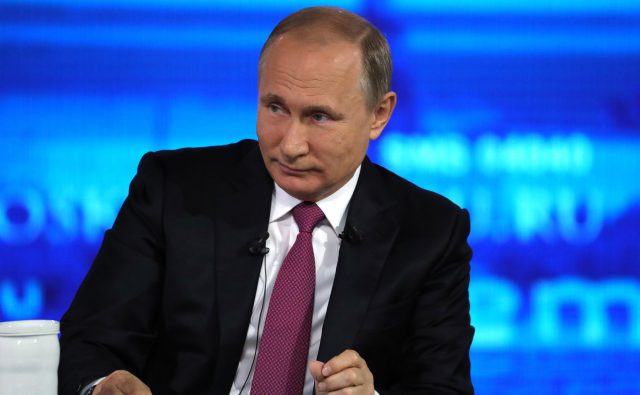
Russian President Vladimir Putin’s 1 March 2018 speech to the Russian parliament wasn’t about new nuclear weapons or about the United States. I know that sounds remarkable given international reporting on it.
Putin certainly spent considerable time describing a series of new weapons. He waxed long and lyrically on the United States’ alleged resolute pursuit of ballistic missile defences that would undercut Russia’s nuclear arsenal. He then unveiled the weapons that ‘thousands of our experts, outstanding scientists, designers, engineers, passionate and talented workers have been working on for years, quietly, humbly, selflessly, with total dedication’.
Paul Dibb has given an
excellent description of these weapons, their potential capabilities and Russian military doctrine for their use, so I needn’t repeat any of that here.
President Putin knows that US missile defence systems can’t defend against Russia’s nuclear arsenal. He knows that existing intercontinental nuclear ballistic missiles with multiple, manoeuvring warheads—launched in numbers—will overwhelm current and projected US missile defences. He knows, similarly, that Russia can’t defend itself against the US nuclear arsenal. That’s the point of nuclear deterrence. So, what was his speech about?
Putin’s speech was about Russia falling behind the rate of change in the world. This creates a civilisational-scale challenge that Russia will fail unless it makes major changes.
His central theme is that Russia’s future economic and societal health and stability is at risk:
[T]he speed of technological change is accelerating sharply. It is rising dramatically. Those who ride this technological wave will surge far ahead. Those who fail to do this will be submerged and drown in this wave … Technological lag and dependence translate into reduced security and economic opportunities of the country, and, ultimately, the loss of its sovereignty. This is the way things stand now.
Most starkly, ‘[i]t is not a question of someone conquering or devastating our land. No, that is not the danger. The main threat and our main enemy is the fact that we are falling behind.’
His speech puts a positive gloss on multiple problem areas, channelling an old election line from Tony Blair: ‘We have come so far, but we still have so far to travel.’
Throughout, the Russian president used statistics from the low point after the Soviet Union’s fall to show how much he had achieved since then. This provides a patina of progress to cover the enormous gaps in Russia’s healthcare, infrastructure, industrial base, energy grid, rail system and city infrastructures, as well as ongoing problems like corruption. His speech recognises that these gaps show that Putin’s isn’t delivering the quality of life or the prosperity the Russian people want.
But post-Soviet stats only go so far. To note two of the many challenges Putin mentions: 20 million of Russia’s 144 million people still live in poverty, and Russian GDP would have to grow by 50% by 2025 to fund Putin’s commitments.
This is what made the new weaponry so important. Putin used the weapons as tangible demonstrations that Russia has the scientific, engineering and technical capacity—and the skilled people and knowledge—to achieve ‘genuine breakthroughs’. His logic is that ‘if we can do this with these amazing weapons, we can make similar breakthroughs in medicine, healthcare, digitised industry, and reinvent Russian cities and towns’.
The problem isn’t that some of these weapons may actually not exist or only be in early development. The problem President Putin faces is that the massive transformation he says is required across the Russian economy, government and society require money for investment that Russia doesn’t have, and skilled people in numbers that Russia doesn’t have.
Putin’s speech reveals the pressures and ambitions that drive him. Read properly, in the context of recent Russian decisions and actions, it’s quite revealing.
Its reception in Western media has shown that the sensational trumps the important in our news, and that Putin has an unerring ability to play the international media.
Putin’s mastery of international media is part of the larger phenomenon that is Russia today. As his speech reveals, Russia’s economy is stagnant, but mathematics, science and technology research in the defence sector are strong—because they’ve been protected and prioritised during the time of Russia’s economic weakness. Putin’s intent seems to be to use Russian strengths to re-establish Russia’s power and influence in the world, but in a novel way.
The Russian military used hybrid warfare in Crimea and in Ukraine. Putin seems a leader who will use the combination of military power, cyber power and media management in ways that surprise and disconcert Russia’s adversaries. He’s a hybrid leader.
As Russia struggles to deliver on the domestic challenges he recognises, we can be pretty sure Putin will use Russian power and its role in international affairs to distract the Russian people and to stoke their pride in their great and historic civilisation.
 Print This Post
Print This Post